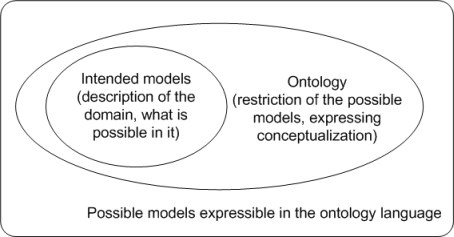Specification of Conceptualization
The second definition of ontology mentioned above, "explicit specification of conceptualization", comes from Thomas Gruber. The exact meaning depends on the understanding of the terms "specification" and "conceptualization". Explicit specification of conceptualization means that an ontology is a description (like a formal specification of a program) of the concepts and relationships that can exist for an agent or a community of agents. This definition is consistent with the usage of ontology as set of concept definitions, but more general.

Ontology expressing intended models for description of the domain
A conceptualization can be defined as an intensional semantic structure that encodes implicit knowledge constraining the structure of a piece of a domain. Ontology is a (partial) specification of this structure, i.e., it is usually a logical theory that expresses the conceptualization explicitly in some language. Conceptualization is language independent, while ontology is language dependent. The use can be illustrated in the figure below - it shows how an ontology restricts (i.e., defines) possible use of constructs used in the description of the domain. Notice that ontology does not have to express all the possible constraints - the level of details in conceptualization depends on the requirements of the intended application and expressing conceptualization in ontology in addition depends on the used ontology language.
In this sense, ontology is important for the purpose of enabling knowledge sharing and reuse. An ontology is in this context a specification used for making ontological commitments. Practically, an ontological commitment is an agreement to use a vocabulary (i.e., ask queries and make assertions) in a way that is consistent (but not complete) with respect to the theory specified by an ontology. Agents then commit to ontologies and ontologies are designed so that the knowledge can be shared among these agents.
The representation of a body of knowledge (knowledge base) is based on the specification of conceptualization. A conceptualization is an abstract, simplified view of the world that we wish to represent for some purpose. Every knowledge base, knowledge-based system or agent is committed to some conceptualization, explicitly or implicitly. For these systems, what "exists" is what can be represented. When the knowledge of a domain is represented in a declarative formalism, the set of objects that can be represented is called the universe of discourse. This set of objects and the describable relationships among them are reflected in the representational vocabulary with which a knowledge-based program represents knowledge. Thus, in the context of AI, we can describe the ontology of a program by defining a set of representational terms. In such an ontology, definitions associate the names of entities in the universe of discourse (e.g. classes, relations, functions, or other objects) with descriptions of what the names mean, and formal axioms that constrain the interpretation and well-formed use of these terms. Formally it can be said that an ontology is a statement of a logical theory.
The backbone of ontology is often a taxonomy. Taxonomy is a classification of things in a hierarchical form. It is usually a tree or a lattice that express subsumption relation - i.e., A subsumes B meaning that everything that is in A is also in B. An example is classification of living organisms. The taxonomy usually restricts the intended usage of classes - where classes are subsets of the set of all possible individuals in the domain. A taxonomy of properties can be defined as well.
However, ontologies need not to be limited to taxonomic hierarchies of classes and need not to be limited to definitions that only introduce terminology and do not add any knowledge about the world. To specify a conceptualization, axioms that constrain the possible interpretations for the defined terms may be also needed. Pragmatically, an ontology defines the vocabulary with which queries and assertions are exchanged among agents. The ontological commitment is then a guarantee of consistency for communications.
(c) Marek Obitko, 2007 - Terms of use
